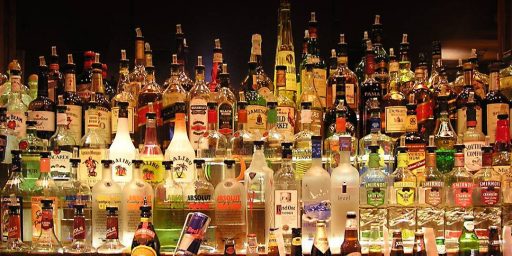Afghanistan Alcohol Sales Create Culture Clash
One major change in liberated Afghanistan is that liquor is now legally sold to non-Muslims. Unfortunately, that has created some conflicts between conservative and liberal Afghans.
Compromise on alcohol leaves Afghans shaken, stirred (Chicago Tribune)
No one wants to see Abdul Jabar Sabit when he walks into a bar. Yet nervous workers still rush up, with forced smiles and handshakes, asking if he’d like a soda or a seat. Sabit wants neither. In his traditional robe and hat, with a full, white beard, he is the Afghan equivalent of the moral police, the main enforcer in Kabul against alcohol and prostitution. “You are Muslim, aren’t you?” he said to the Turkish manager of one fully stocked bar. “You aren’t allowed to serve this liquor.” “We are Muslim,” manager Cenk Acar said. “But this is business.”
The business of selling alcohol is one measure of how life has changed in Kabul since the Taliban, which banned it as un-Islamic, fled in late 2001. Alcohol has become lucrative but it has also become a sore point between foreigners here and many locals. Afghanistan has struck an uneasy balance between law and practicality. The constitution bans alcohol, but foreigners are allowed to drink it. This double standard has caused resentment among liberal and conservative Afghans. Many liberal Afghan men would like to drink alcohol. Conservative Afghans would like to rid the country of all alcohol, and, if necessary, the foreigners blamed for bringing it in.
The growing number of bars and restaurants symbolizes the power of the estimated 2,000 foreign workers in Kabul and a potential spark for any backlash from ordinary Afghans. This is still an Islamic republic, where women are jailed for marrying against family wishes or for adultery. As of late March, 84 businesses were licensed to serve liquor in Kabul, according to tourism officials. Sabit, the legal adviser to the Interior Ministry, insists there are many more.
[…]
Many clubs that cater to foreigners try to maintain a low profile. But in late March, the Disco Restaurant opened in an Afghan neighborhood–as opposed to areas where foreigners live–behind a hospital. The new club hung a banner along the sidewalk featuring a half-naked dancing couple. Within hours, several Afghans complained, and the couple was ripped off the banner.
When about 20 Afghans tried to enter on the first two nights, they were turned away. Many in the neighborhood wanted to go to the Disco Restaurant, which serves no food, instead serving up music, liquor, disco lights, high school prom decorations and four Chinese women willing to dance with any foreign man. Zhaogia Guo, who opened the club, said he wanted to make some money and give foreign men a place to dance. His club is the first so-called disco in the country. “Because of Islam, maybe the disco is not yet possible,” the club owner, who is Chinese, said. “But Afghanistan has developed very rapidly. Maybe people will accept it in the future.”
An interesting cultural clash. On the one hand, the ability to make personal choices on such thing as drinking alcohol is a hallmark of a free society. On the other, something so anathema to the local religious culture can create deep resentment and hostility.






I had the opportunity to see how different Islamic cultures deal with this. In Turkey and Bahrain, it was pretty much “Do what you want, but you’re the one who’s going to have to answer come Judgment Day.” In Egypt and Tunisia, it was mostly the same, but officious bartenders and waiters would admonish Muslim-looking drinkers, particularly if it was during Ramadan. Then there’s Kuwait and Saudi Arabia, where drinking is a criminal offense. When in Rome….